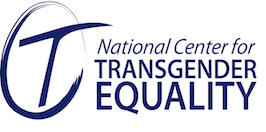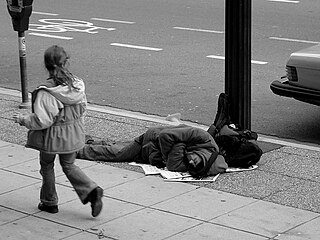
Homelessness is the condition of people lacking "a fixed, regular, and adequate nighttime residence" as defined by The McKinney–Vento Homeless Assistance Act. According to the US Department of Housing and Urban Development's Annual Homeless Assessment Report, as of 2018 there were around 553,000 homeless people in the United States on a given night, or 0.17% of the population.
Bumfights: A Cause for Concern is a film produced by Indecline Films. The video features primarily high school fights caught on tape and homeless men in the San Diego, San Francisco, Los Angeles, and Las Vegas metropolitan areas attempting amateur stunts in a style inspired by the popular MTV series Jackass. Bumfights: A Cause for Concern (2002), was produced by Ryen McPherson, with friends Zachary Bubeck, Daniel J. Tanner, and Michael Slyman, as Indecline Films. Contrary to its title, the video does not depict homeless men actually fighting, but instead a compilation of street fights caught on tape and homeless men performing in skits and stunts.

The National Center for Transgender Equality (NCTE) is a nonprofit social equality organization founded in 2003 by transgender activist Mara Keisling in Washington, D.C.. The organization works primarily in the areas of policy advocacy and media activism with the aim of advancing the equality of transgender people in the United States. Among other transgender-related issue areas, NCTE focuses on discrimination in employment, access to public accommodations, fair housing, identity documents, hate crimes and violence, criminal justice reform, federal research surveys and the Census, and health care access.
Racial steering refers to the practice in which real estate brokers guide prospective home buyers towards or away from certain neighborhoods based on their race. The term is used in the context of de facto residential segregation in the United States, and is often divided into two broad classes of conduct:
- Advising customers to purchase homes in particular neighborhoods on the basis of race
- Failing, on the basis of race, to show, or to inform buyers of homes that meet their specifications.
Hate crime laws in the United States are state and federal laws intended to protect against hate crimes motivated by enmity or animus against a protected class of persons. Although state laws vary, current statutes permit federal prosecution of hate crimes committed on the basis of a person's protected characteristics of race, religion, ethnicity, nationality, gender, sexual orientation, gender identity, and disability. The U.S. Department of Justice (DOJ)/FBI, as well as campus security authorities, are required to collect and publish hate crime statistics.
The Chicago Lawyers' Committee for Civil Rights is a consortium of American law firms in Chicago that provides legal services in civil rights cases, with a focus on seven major projects: the Education Equity Project, the Community Law Project, the Housing Opportunity Project, the Hate Crimes Project, Voting Rights Project, Police Accountability Project and Settlement Assistance Program. Recent activity has explored avenues to promote and protect civil rights in the Chicago metropolitan area through education, healthcare delivery, the environment, and voting rights.
The Leadership Conference on Civil and Human Rights, formerly called the Leadership Conference on Civil Rights, is an umbrella group of American civil rights interest groups.
The Coalition on Homelessness is a homeless advocacy and social justice organization that focuses on creating long-term solutions to homelessness, poverty, and housing issues in San Francisco, California. Founded in 1987, the Coalition has since remained a leader in homeless advocacy over the years. The Coalition on Homelessness has also founded the newspaper Street Sheet, the Community Housing Partnership, and the Western Regional Advocacy Project (WRAP).
The National Law Center on Homelessness and Poverty (NLCHP) is an American nonprofit organization that uses the power of the law to end and prevent homelessness, through training, advocacy, impact litigation, and public education. It was founded in 1989 by Maria Foscarinis and is based in Washington, D.C.
Discrimination against the homeless is the act of treating the homeless, or those perceived to be homeless, unfavorably. As with most types of discrimination it can manifest in numerous forms.

Anti-homelessness legislation can take two forms; legislation that aims to help and re-house homeless people, and legislation that is intended to send the homeless to homeless shelters compulsively, or criminalize homelessness and begging.

The transgender rights movement is a movement to promote transgender rights and to eliminate discrimination and violence against transgender people regarding housing, employment, public accommodations, education, and health care. In some jurisdictions, transgender activism seeks to allow changes to identification documents to conform with a person's current gender identity without the need for sex reassignment surgery.
Open Communities (formerly Interfaith Housing Center of the Northern Suburbs) is a nonprofit organization that advocates for fair and affordable housing in 17 northern suburbs of Chicago. Open Communities' mission is to educate, advocate and organize to promote just and inclusive communities in north suburban Chicago. Open Communities works with current and prospective residents and local groups to promote economically and culturally diverse communities. Free services include fair and affordable housing counseling services, community education, advocacy, and organizing for welcoming communities.

The City is For All is a volunteer based grassroots organization operating in Budapest (Hungary), in which homeless and non-homeless activists work together for housing rights and social justice.

Jewish Council on Urban Affairs (JCUA) is a not-for-profit organization based in Chicago, Ill., that works with diverse neighborhoods and community groups to battle discrimination, antisemitism, poverty and other forms of oppression. Judy Levey is the current executive director.
Picture the Homeless (PTH) is an American homeless person–led rights organization founded in 1999 based in the New York, New York. It focuses on human rights, housing, police violence and other social justice issues. It was housed originally in Judson Memorial Church, which still hosts its Longest Night of the Year memorial event, and was located for a time in El Barrio and 2427 Morris Avenue in the Bronx. It is currently based on 126th Street in Manhattan.
The Homeless Bill of Rights refers to legislation protecting the civil and human rights of homeless people. These laws affirm that homeless people have equal rights to medical care, free speech, free movement, voting, opportunities for employment, and privacy. Legislation of this type is currently being debated at the state level in the United States. Over 120 organizations in five different states have shown public support for a Homeless Bill of Rights and are working towards its implementation. A Homeless Bill of Rights has become law in Rhode Island, Connecticut and Illinois and is under consideration by several other U.S. states, including California, Delaware, Minnesota, Missouri, Oregon, Tennessee, and Vermont.
Transgender inequality is the unequal protection transgender people receive in work, school, and society in general. Transgender people regularly face transphobic harassment. Ultimately, one of the largest reasons that transgender people face inequality is due to a lack of public understanding of transgender people.
Homelessness in the United States exists in every state. Each state has different laws and other conditions which influence the number of homeless persons and what services are available to their homeless people.

Maria Foscarinis is the founder and executive director of the National Law Center on Homelessness & Poverty, a not-for-profit organization based in Washington, D.C. that serves as the legal arm of the national movement to end homelessness. She was a primary architect of the Stewart B. McKinney Homeless Assistance Act, now known as the McKinney–Vento Homeless Assistance Act, the first major federal legislation resolving homelessness, and has led successful litigation to secure the individual legal rights. Foscarinis writes regularly about legal and policy issues affecting homeless and poor persons, and is frequently in national and local media. In 2016 Foscarinis was awarded the Katharine and George Alexander Law Prize from Santa Clara University School of Law for her work to alleviate injustice and inequity.







